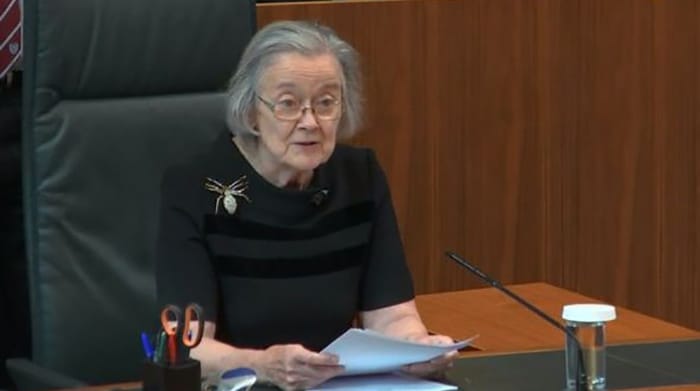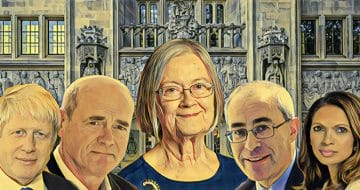Unanimous decision finds that suspension was ‘unlawful, void and of no effect’

The Supreme Court has smashed out its historic judgment on the suspension of parliament, finding decisively in favour of the anti-Brexit activists trying to get MPs back to work.
In a unanimous ruling handed down this morning, 11 justices found that the issue was a matter for the courts and that Boris Johnson’s decision to prorogue parliament was unlawful.
The judgment means that parliament is no longer suspended and can resume sitting immediately to debate Brexit.
Supreme Court president Lady Hale, sporting one of her trademark brooches, said that “the decision to advise Her Majesty to prorogue parliament was unlawful because it had the effect of frustrating or preventing the ability of parliament to carry out its constitutional functions without reasonable justification”.
As a result, the written judgment (in full below) says, the supposed suspension was also “unlawful, null and of no effect… parliament has not been prorogued”. Putting the matter beyond doubt, the court quashed the royal Order in Council authorising the prorogation, saying that it was no more than “a blank sheet of paper”.
Hale, who retires in a few months’ time, criticised the government’s “prolonged suspension of parliamentary democracy” at a crucial time, adding that “the effect upon the fundamentals of our democracy was extreme”.
Justifying the decision to find the matter justiciable, Hale said that “the courts have exercised a supervisory jurisdiction over the lawfulness of acts of the government for centuries. As long ago as 1611, the court held that ‘the King [who was then the government] hath no prerogative but that which the law of the land allows him'”.
Although the judgment stressed that the court was not concerned with the Prime Minister’s motives in proroguing parliament, it said that “impossible for us to conclude, on the evidence which has been put before us, that there was any reason — let alone a good reason — for the five-week suspension”.
Parliament can now return to debating Brexit if it wants. Hale said that the Prime Minister doesn’t need to do anything to make that happen, although ministers have refused to rule out a second prorogation.
Many legal commentators had assumed that the government would lose the case, but the scale of the defeat was unexpected. Adam Wagner of Doughty Street Chambers said that “even the most gung ho lawyers thought there would be a majority”, while Dinah Rose QC of Blackstone described it as an “absolute rout”.
James Libson, the lawyer for successful appellant Gina Miller, said: “We are glad that the Court recognised the threat to the rule of law caused by a prorogation based on misleading advice given to the Queen. This second success for our client Gina Miller in the Supreme Court is a testament to her resolve to take whatever steps are required to ensure executive overreach does not become a feature of our democracy. This case shows that our courts can be relied on to hold the executive to account when necessary and is evidence of the robustness of our system of separations of powers”.
Thomas de la Mare QC was more succinct, tweeting simply: “Get in”.
The recall of MPs, though politically seismic, will not have necessarily had a major impact on Brexit itself. Parliament has repeatedly voted against almost every possible Brexit plan put before it.
But as it deals with fundamental questions about the relationship of Parliament, government and the courts, law students will be reading the Cherry/Miller case for many years to come.


